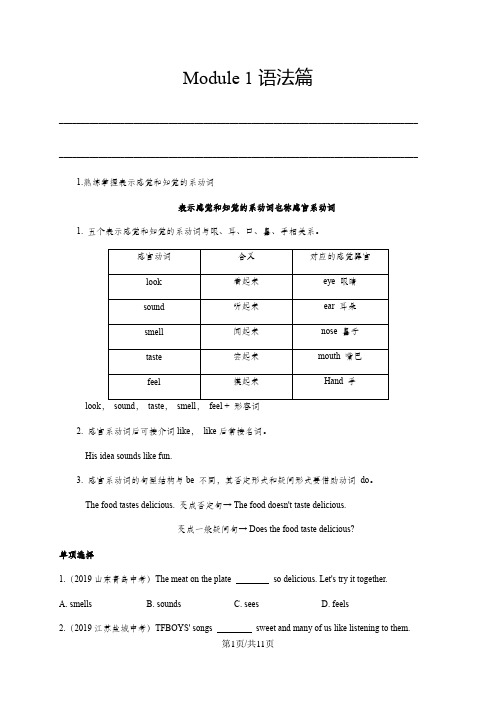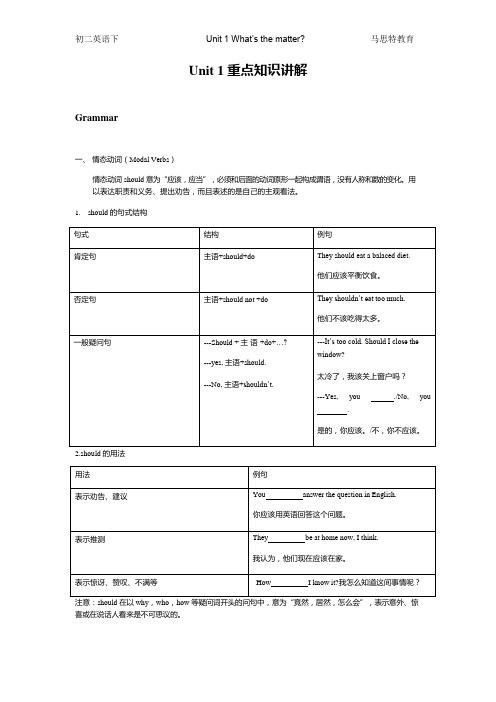人教版初二(下)英语第2讲:unit 1 语法篇(学生版)-最新教育文档
- 格式:docx
- 大小:32.89 KB
- 文档页数:10


Unit 1 单元语法知识梳理一、情态动词should的用法情态动词should有自己的意义,但不能单独作谓语,只能和其他动词一起构成谓语,表示说话人的态度或看法,后接动词原形。
常见用法有以下几点:1.表示劝告、建议等,意为“应该”,常指根据常理认为对的事或应该去做的事。
当劝某人做或不做某事时,常用“should do sth.”或“shouldn't do sth.”。
should 比must 和ought to 语气更加委婉。
例句:You should brush your teeth before you go to bed.你在睡觉前应该刷牙。
You shouldn't watch TV every day.你不应该每天看电视。
2.通常用来表示现在或将来的责任或义务。
例句:Children should obey their parents.孩子们应该听从他们的父母。
We should respect the old.我们应该尊敬老人。
3.表示推断,意为“应该;可能”。
例句:They should be there by now,I think.我觉得现在他们应该都已经到了。
4.用于第一人称疑问句,询问对方的意愿,表示说话人的一种谦逊、客气、委婉的语气。
例句:Should I open the window? 我可以打开窗户吗?What should we do now? 我们现在该干什么呢?5.表示某种感情色彩,意为“竟会”,常用于以how, why开头引导的特殊疑问句中。
例句:Why should you be so early today? 你今天为什么会如此早?二、反身代词1.反身代词的构成反身代词是一种表示反射或强调的代词。
它由第一人称、第二人称的形容词性物主代词和第三人称代词的宾格加词尾-self或-selves构成。
其构成如下表:反身代词与它所指代的名词或代词形成互指关系,两者在人称和数上应保持一致。


Unit 1 语法篇____________________________________________________________________________________________________________________________________________________________________学生通过本讲学习,能够掌握本单元的重点词汇句型,并在综合能力上有一定的拓展。
宾语从句:引导词宾语从句的引导词常常有以下三种:由陈述句转化而来的宾语从句,引导词为that,that在口语或非正式文体中可省略;由一般疑问句转化而来的宾语从句,引导词为if或whether;由特殊疑问句转化而来的宾语从句,引导词为句子本身的特殊疑问词,即what,when,where等。
如:I think(that)he will come here by train. 我认为他会坐火车来这儿的。
He asked me if / whether I know his new address. 他问我是否知道他的新地址。
I want to know when you got back home yesterday. 我想知道你昨天什么时候到家的。
:语序宾语从句的语序为陈述句语序,即“主语+谓语+宾语+其他”。
也就是说,将疑问句转化成宾语从句时,一定要将疑问句语序转变成陈述句语序。
如:Can you tell me what he will do tomorrow? 你能告诉我他明天将要做什么吗?当疑问句在宾语从句中做主语时,语序不变。
如:Do you know what makes him so excited? 你知道什么事使他如此兴奋吗?I don’t know what is wrong with him. 我不知道他出什么事了。
时态主句为一般现在时态,则宾语从句根据实际情况用任意的时态;但主句为一般过去时态时,宾语从句则要用过去的相对应的某种时态。

Unit 1第一部分:Grammar一、情态动词(Modal Verbs)情态动词should意为“应该,应当”,必须和后面的动词原形一起构成谓语,没有人称和数的变化。
用以表达职责和义务、提出劝告,而且表述的是自己的主观看法。
1.should的句式结构句式结构例句肯定句主语+should+do They should eat a balaced diet.他们应该平衡饮食。
否定句主语+should not +do They shouldn’t eat too much.他们不该吃得太多。
一般疑问句---Should + 主语+do+…?---yes, 主语+should.---No, 主语+shouldn’t.---It’s too cold. Should I close the window?太冷了,我该关上窗户吗?---Yes, you ______./No, you ________.是的,你应该。
/不,你不应该。
2.should的用法用法例句表示劝告、建议You _________ answer the question in English.你应该用英语回答这个问题。
表示推测They _________ be at home now, I think.我认为,他们现在应该在家。
表示惊讶、赞叹、不满等How _________ I know it?我怎么知道这间事情呢?注意:should在以why,who,how等疑问词开头的问句中,意为“竟然,居然,怎么会”,表示意外、惊喜或在说话人看来是不可思议的。
二、其他表示建议的句型用法例句Shall we/I + do+…?Shall we _________ for a walk? 咱们去散步好吗?What/How about+doing/sth…?What about _________ swimming? 去游泳怎么样?Let’s + do…?Let’s _________ and _________ them.咱们去看看他们吧。

Module 1语法篇__________________________________________________________________________________ __________________________________________________________________________________1.熟练掌握表示感觉和知觉的系动词表示感觉和知觉的系动词也称感官系动词1. 五个表示感觉和知觉的系动词与眼、耳、口、鼻、手相关系。
look,sound,taste,smell,feel + 形容词2. 感官系动词后可接介词like,like后常接名词。
His idea sounds like fun.3. 感官系动词的句型结构与be 不同,其否定形式和疑问形式要借助动词do。
The food tastes delicious. 变成否定句→ The food doesn't taste delicious.变成一般疑问句→ Does the food taste delicious?单项选择1.(2019山东青岛中考)The meat on the plate so delicious. Let's try it together.A. smellsB. soundsC. seesD. feels2.(2019江苏盐城中考)TFBOYS' songs sweet and many of us like listening to them.A. soundB. feelC. tasteD. look3. This silk dress so smooth. It's made in China.A. feelsB. smellsC. soundsD. tastes4.(2019内蒙古呼和浩特中考)---What do you think of the woman singer?---Her voice sounds .I like her songs.A. sweetB. sweetlyC. badD. badly5.(2019山东聊城文轩中学期中)I like the dress very much. It in the long skirt.A. feelsB. tastesC. soundsD. smells6.(2019山东潍坊中考)---What will a science museum be like if you are asked to build one? ---I hope it will like a book.A. tasteB. soundC. lookD. smell基础演练一、选词填空(句子选词填空)look smell feel sound taste1. They tired and they didn't want to go on walking.2. The music wonderful. Play it again.3. The flowers very sweet.4. The food in the bowl delicious and I wanted some more.5. My father is very tall. He strong.二、单项选择1. --- The song beautiful. Who wrote it?--- I don't know.A. smellsB. looksC. soundsD. feels2. Is this a photo of your daughter? She looks in the red dress!A. lovelyB. happilyC. quietlyD. politely3. --- Your new dress looks so nice.A. That's OKB. ThanksC. Don't say soD. Very good4. The food doesn't smell fresh,we can't eat it.A. becauseB. soC. butD. if5. Something is wrong with his . He can't hear anything.A. eyesB. earsC. handsD. nose巩固提高三、按要求转换句型1. The bananas look fresh. (改为否定句)The bananas fresh.2. The cookie tastes delicious. (改为一般疑问句)the cookie delicious?四、翻译(根据中文提示完成句子)1. 怎么了?你看上去很伤心。


Unit1 What’s the matter?一、语法:1、对身体健康状况的询问询问病人病情时最常用的是:What’s the matter?意思是“怎么了”,其后通常与with连用。
What’s the matter with him/her…?他/她怎么了?类似的问句还有:What’s wrong?What’s wrong with you?What’s your trouble?What’s the trouble with you?What’s up?回答:He/She has a cold.他(她)感冒了。
have a/an + 疾病名词“患……病”(a toothache牙疼;a fever发烧;a sore throat喉咙痛;a stomachache胃痛;a cough咳嗽;a headache头疼;a sore back背痛;a nosebleed流鼻血;a heart problem心脏病)身体部位+ache(疼痛)构成新的复合词stomach+ache=stomachachehead+ache=headache tooth+ache=toothache back+ache=backache后背痛He hurt himself.(She hurt herself.)他伤到了自己。
He gets sunburned.他晒伤了。
cut his finger 切手指get hit on the head 撞到头get hit by the ball 被球撞到get sick 感到不舒服cut himself 割伤自己2、情态动词should的用法①表示“应该,应当”should作为情态动词最基本的意思是“应该”——既可指有责任或义务“应该”做某事。
He should work harder. 他应该更加努力。
You should help your mother with the housework. 你应该帮你母亲做家务。


Unit 1 语法篇____________________________________________________________________________________________________________________________________________________________________学生通过本讲学习,能够掌握本单元的重点语法,并在综合能力上有一定的拓展。
一、情态动词can的基本用法情态动词can有一定的词义,但不能独立存在,它必须与动词原形一起构成谓语。
情态动词can没有人称和数的变化。
其具体用法如下:1.表示"能、会",指脑力或体力方面的"能力"。
例如:I can speak English.我会讲英语。
Jim can swim but I can't.吉姆会游泳,但我不会。
2.表示"可能",常用于否定句或疑问句中,指某种可能性。
例如:Han Mei can't be in the classroom.韩梅不可能在教室里。
Can he come here today, please?请问他今天能到这里来吗?3.表示"可以",常用于口语中,指许可或请求做某事。
例如:Can I have a cup of tea, please?请问我可以喝一杯茶吗?You can go out.你可以出去了?二、情态动词的注意事项1. can的口诀:情态动词can、can、can,动词原形跟后面。
变疑问can提前,变否定not后面加上去。
主语人称单复数,情态动词不能变。
2. 情态动词can可以引导肯定句和疑问句。
(1)、肯定句:主语 + can + 动词原形 + 其他成分(2)、疑问句:can + 主语 + 动词原形 + 其他成分3.can 引导的肯定句变为疑问句的方法:(一调二改三问号)(1)、can 提前,首字母大写。

Unit 1 语法篇__________________________________________________________________________________ __________________________________________________________________________________学生通过本讲学习,能够掌握本单元的重点语法,并在综合能力上有一定的拓展。
should的用法:1. 用于第一人称疑问句,表征询意见。
如:Should I open the window? 我可以开窗户吗?2. should表义务或提建议,可用于各种句式,通常指将来。
如:You should do what your parents tell you.你应该照你父母的话去做事。
He should do some work, but he doesn’t want to.他应该做些工作,但是他不想做。
也可指现在。
如:You shouldn’t feel so unhappy over such trifles.对这种小事,你不应该感到这么不高兴。
You shouldn’t be sitting in the sun.你不应该坐在阳光下。
3. should表推测,暗含很大的可能。
如:It’s 4:30. They should be in New York by now.现在是四点半,他们应该到达纽约了。
Three weeks should suffice.三个星期应该足够了。
4. should可在某些从句中,表虚拟语气。
如:I suggest that you should stay here as if nothing had happened.我建议你应该待在这儿,好像什么事也没有发生。
She was terrified lest they should go on talking about her.她感到害怕,唯恐他们再说她的事。

Unit 1 重点知识讲解Grammar一、情态动词(Modal Verbs)情态动词should 意为“应该,应当”,必须和后面的动词原形一起构成谓语,没有人称和数的变化。
用以表达职责和义务、提出劝告,而且表述的是自己的主观看法。
1.should 的句式结构2.s hould 的用法喜或在说话人看来是不可思议的。
二、其他表示建议的句型表示反射或强调的代词叫做反身代词。
反身代词是由第一人称、第二人称形容词性物主代词或第三人称代词的宾格形式,词尾加self 或selves 组成。
反身代词可译“本人”、“本身”,为加强语气,也常翻译为“亲自”、“自己”。
不定人称代词one ---- oneself.1、反身代词的分类2、反身代词的用法单词的用法Section A1.What’s the matter?怎么了?该句常用询问某人患了何种疾病或遇到了什么麻烦,其后用with 引出对象。
1). What’s the matter with sb.?=what’s wrong with sb.?=what’s the trouble/problem with sb.?=what’s one’s trouble/problem?e.g. What’s the matter with Tom?=what’s with Tom?=What’s the with Tom?=What’s Tom’s?2). matter, 名词,“问题,事情”e.g. We have important (matter) to discuss.我们有些重要的问题要讨论。
3). 动词,“要紧,关系重大”e.g. It dosen’t that you came late.2.I have a cold.我感冒了。
1).have/get/catch a cold “感冒,着凉”The old man a cold yesterday.那位老人昨天感冒了。

Unit 1 语法篇__________________________________________________________________________________ __________________________________________________________________________________学生通过本讲学习,能够掌握本单元的重点语法,并在综合能力上有一定的拓展。
should的用法:1. 用于第一人称疑问句,表征询意见。
如:Should I open the window? 我可以开窗户吗?2. should表义务或提建议,可用于各种句式,通常指将来。
如:You should do what your parents tell you.你应该照你父母的话去做事。
He should do some work, but he doesn’t want to.他应该做些工作,但是他不想做。
也可指现在。
如:You shouldn’t feel so unhappy over such trifles.对这种小事,你不应该感到这么不高兴。
You shouldn’t be sitting in the sun.你不应该坐在阳光下。
3. should表推测,暗含很大的可能。
如:It’s 4:30. They should be in New York by now.现在是四点半,他们应该到达纽约了。
Three weeks should suffice.三个星期应该足够了。
4. should可在某些从句中,表虚拟语气。
如:I suggest that you should stay here as if nothing had happened.我建议你应该待在这儿,好像什么事也没有发生。
She was terrified lest they should go on talking about her.她感到害怕,唯恐他们再说她的事。

英语人教版八年级下册U n i t-2--1a---2dUnit2 I Will help to clean up the city parksSectionA(1a-----2d)一、教学目标1.语言知识目标(1)能掌握以下单词:clean up city cheer cheer up give out volunteer(2)能了解以下语法情态动词could should的用法;用should could提出建议并对别人的建议进行评价。
如何表达主动提出帮助。
2.情感价值观目标在授课过程中渗透助人就是助己,助人收获快乐的情感目标。
培养学生为他人着想,热爱公益事业,乐于之人的优良品质。
二、教学重难点(一)教学重点:1.学会用情态动词could表达建议;2.正确使用有关援助的表述、短语动词以及相关表达中的动词不定式;3.就志愿者活动这一话题分角色表演对话;(二)教学难点:1.学会提供帮助的基本句型;2.理解不同短语动词的含义与搭配;三、教学策略语音教学——让学生进行模仿操练;词汇教学——采取情景介绍的方式进行教学,让学生在情境中操练、理解含义,并学会运用;口语教学——采取 Pair work和Group work 问答式的口语交际活动互相操练;听力教学——采取句子排序、图文配对和文章填空的方式。
四、教学过程Step I Free talk1.要求学生试读课本单词表中的单词和短语,帮助学生解决语音问题。
2.询问学生是否知道提供帮助和表建议的句型,在黑板上板书。
3.向学生提三个问题。
(1)Do you often help people?(2)Tell us something about the last time you helped others.(3)How could we help people?StepⅡ Warming-up1.让学生观看一个“青年志愿者之歌”的视频,看之前,抛出问题“What do volunteers do to help people in the video?”要求学生把答案写下来。

Unit 1 语法篇____________________________________________________________________________________________________________________________________________________________________学生通过本讲学习,能够掌握本单元的重点语法,并在综合能力上有一定的拓展。
一般过去时一般过去时表示过去某时发生的动作或状态,这种动作或状态可能是一次性,也可能经常发生。
①表示过去具体时刻发生的一次性动作时,时间状语有:at (eight) (yesterday morning),(ten minutes) ago, when引导的时间状语从句。
如:I got up at 6:00 this morning.(我是早上六点钟起床的)Little Tom broke the window at half past nine this morning.(小汤姆今天早上九点半把窗子打破了)When he went into the room,he saw a stranger talking with his father.(他走进房间时发现一个陌生人正和他父亲谈话)②表示过去一段时间内不知何时发生的一次性动作时,时间状语有:yesterday, last (year等), in (1998 等)。
如:He came to our city in the year 2000.(他2000年来到我们市)③表示过去一个阶段中经常发生的事情时,时间状语有:last…, in…, from…to…, for(10years),often,usually, sometimes, always, never等。
如:Mr Jackson usually went to evening schools when he was young. / Every day he went to the rich man and borrowed books from him.④讲故事、对过去经历的回忆、双方都明白的过去事件等一般用过去时,而且经常省略时间状语。

Unit1语法篇__________________________________________________________________________________ __________________________________________________________________________________1.熟练掌握表示感觉和知觉的系动词表示感觉和知觉的系动词也称感官系动词1. 五个表示感觉和知觉的系动词与眼、耳、口、鼻、手相关系。
look, sound, taste, smell, feel + 形容词2. 感官系动词后可接介词like, like后常接名词。
His idea sounds like fun.3. 感官系动词的句型结构与be 不同,其否定形式和疑问形式要借助动词do。
The food tastes delicious. 变成否定句→ The food doesn't taste delicious.变成一般疑问句→ Does the food taste delicious?单项选择1.(2017山东青岛中考)The meat on the plate so delicious. Let's try it together.A. smellsB. soundsC. seesD. feels2.(2017江苏盐城中考)TFBOYS' songs sweet and many of us like listening to them.A. soundB. feelC. tasteD. look3. This silk dress so smooth. It's made in China.A. feelsB. smellsC. soundsD. tastes4.(2017内蒙古呼和浩特中考)---What do you think of the woman singer?---Her voice sounds .I like her songs.A. sweetB. sweetlyC. badD. badly5.(2017山东聊城文轩中学期中)I like the dress very much. It in the long skirt.A. feelsB. tastesC. soundsD. smells6.(2018山东潍坊中考)---What will a science museum be like if you are asked to build one? ---I hopeit will like a book.A. tasteB.soundC. lookD. smell基础演练一、选词填空(句子选词填空)look smell feel sound taste1. They tired and they didn't want to go on walking.2. The music wonderful. Play it again.3. The flowers very sweet.4. The food in the bowl delicious and I wanted some more.5. My father is very tall. He strong.二、单项选择1. --- The song beautiful. Who wrote it?--- I don't know.A. smellsB. looksC. soundsD. feels2. Is this a photo of your daughter? She looks in the red dress!A. lovelyB. happilyC. quietlyD. politely3. --- Your new dress looks so nice.--- .A. That's OKB. ThanksC. Don't say soD. Very good4. The food doesn't smell fresh, we can't eat it.A. becauseB. soC. butD. if5. Something is wrong with his . He can't hear anything.A. eyesB. earsC. handsD. nose巩固提高三、按要求转换句型1. The bananas look fresh. (改为否定句)The bananas fresh.2. The cookie tastes delicious. (改为一般疑问句)the cookie delicious?四、翻译(根据中文提示完成句子)1. 怎么了?你看上去很伤心。

Unit 1 语法篇__________________________________________________________________________________ __________________________________________________________________________________学生通过本讲学习,能够掌握本单元的重点语法,并在综合能力上有一定的拓展。
should的用法:1. 用于第一人称疑问句,表征询意见。
如:Should I open the window? 我可以开窗户吗?2. should表义务或提建议,可用于各种句式,通常指将来。
如:You should do what your parents tell you.你应该照你父母的话去做事。
He should do some work, but he d oesn’t want to.他应该做些工作,但是他不想做。
也可指现在。
如:You shouldn’t feel so unhappy over such trifles.对这种小事,你不应该感到这么不高兴。
You shouldn’t be sitting in the sun.你不应该坐在阳光下。
3. should表推测,暗含很大的可能。
如:It’s 4:30. They should be in New York by now.现在是四点半,他们应该到达纽约了。
Three weeks should suffice.三个星期应该足够了。
4. should可在某些从句中,表虚拟语气。
如:I suggest that you should stay here as if nothing had happened.我建议你应该待在这儿,好像什么事也没有发生。
She was terrified lest they should go on talking about her.她感到害怕,唯恐他们再说她的事。
If he should drop in, give him my message.他若来访,就将我的消息给他。
5. should表感情色彩,常用在以why, how开头的疑问句中。
如:Why shouldn’t you invite him?为什么你不邀请他?I don’t see why we shouldn’t make friends.我不明白为什么我们竟不能成为朋友。
How should I know? 我怎么知道?★在that引导的从句中,should也可表惋惜、忧虑、欢乐、惊讶等感情色彩。
如:I’m sorry that you should think so badly of me.你竟把我想得这样坏,我感到遗憾。
It is absurd that such things should happen to a family like theirs.真可笑,这种事竟发生在他们那样的家庭中。
★should还用于一些特殊结构,表感情色彩。
如:That it should come to this!事情竟到了这种地步!To think that it should have happened to me! 谁想到这种事竟发生在我身上!1. Laura, you eat too much junk food. It's bad for your health.A. canB. mayC. needn'tD. shouldn't2. You talk loudly at the movie theatre. That's impolite.A. couldn'tB. wouldn'tC. shouldn'tD. mightn't3. --- I don't care what my teachers think.--- Well, you .A. couldB. wouldC. shouldD. might4. We use mobile phones when the plane takes off.A. may notB. shouldn'tC. needn'tD. mustn't5. --- How to be a good English learner?--- You read English for about half an hour in the morning.A. shouldn'tB. shouldC. don'tD. do基础演练一、用should或shouldn’t填空1. ——I can’t sleep the night before exams.——You ______ take a warm shower before you go to bed.2. Good friends ______ argue each other.3. There is little milk in the glass. We _______ buy some.4. They didn’t invite you? Maybe you ______ be friendlier.5. I am a little bit overweight. So I think I _______ do exercises every day.6. I think you ________eat less junk food.7. She drives a lot and she seldom walks. So I think she______ walk a lot.8. Students ________spend too much time playing computer games.9. We ______ help the people in need.10. We ______ throw the rubbish into the bin.二、根据要求改写句子(前五题每空一词)1. We should take good care of the young tree. (改为一般疑问句)__________ we _________ good care of the young trees?2. You ought to turn off the lights when you leave the room. (改为一般疑问句)_________ I __________ ___________ off the lights when I leave the room?3. You ought to put your bike under the tree. (改为否定句)You __________ _________ __________ __________ your bike under the tree.4. The child should drink some orange juice. (改为否定句)The child ________ ___________ _________ orange juice.5. They should arrive at the station before 7 o’clock. (就划线部分提问)_________ _________ _________ _________ at the station?6. You should do your homework carefully. (用ought to 改为同义句)_______________________________________________________________________ 7. Tom should look after his little sister. (改为一般疑问句)_______________________________________________________________________ 8. They ought to help their parents do the housework. (改为一般疑问句)________________________________________________________________________ 9. I ought to buy a new bike. (改为否定句)________________________________________________________________________ 10. Lucy should get to school on time. (根据划线部分提问)________________________________________________________________________巩固提高翻译下列句子1.你应该早点上床睡觉。
___________________________________________________________________.2.我应该量一下体温吗?_______________________________________________________________________?3.我觉得你应该躺下休息。
___________________________________________________________________.4. 你认为我应该做些什么?_____________________________________________________________________________?5. 你不应该这样跟他讲话。
_______________________________________________________________________.6. 你们应在三天之内完成这项工作。
_____________________________________________________________________.7. 我想她此刻应该到家了。
_________________________________________________________________________.8. 你正找的那本书应该在书架上。